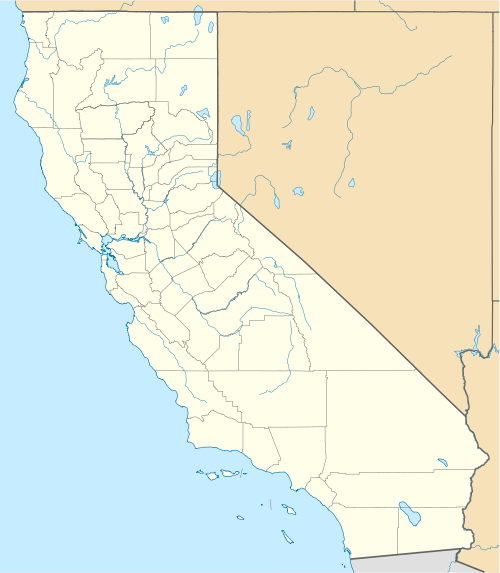Maynard Buehler House
|
Maynard and Katherine Buehler House | |
|
Buehler House, by Frank Lloyd Wright in Orinda, California. | |
  | |
| Location | 6 Great Oak Circle, Orinda, California |
|---|---|
| Coordinates | 37°51′48″N 122°10′8.5″W / 37.86333°N 122.169028°WCoordinates: 37°51′48″N 122°10′8.5″W / 37.86333°N 122.169028°W |
| Area | 4,000 sq ft (370 m2) |
| Built | 1949 |
| Architect | Frank Lloyd Wright |
| Architectural style | Modern Movement-Usonian |
| NRHP Reference # | 06001118[1] |
| Added to NRHP | December 12, 2006 |
The Maynard Buehler House in Orinda, California is a 4,000 square feet (370 m2) Usonian home designed by Frank Lloyd Wright in 1948 for Katherine Z. "Katie" and Maynard P. Buehler.[2]
Description
Architecture
Much of the Maynard Buehler House is steel frame with redwood panel cladding; other portions are concrete block. Like many Usonian homes, the house has a distinct flat roof line, carports, underfloor heating, and is organized on a modular grid system on an L-shaped plan. The carport is cantilevered to the extreme engineering capacity. A prop was put at the corner during construction to prevent sagging. The roof was built two inches too high at that corner and when the prop was removed the roof settled right down to the proper level. This was a trademark of Wright: to take engineering to the extreme.[3]
The long leg of the L houses a wing with three bedrooms,and a small workshop. At the hinge, a small kitchen with wood cabinets and a dark countertop served the family. The more public spaces – a living room, den, and dining room – are arranged at an oblique angle to the main wing. The hexagonal living room opens onto a dramatic space, with a shed roof soaring over it. The sloped ceiling has a large rectangular gold leaf inset that reflects the natural light. The hallway leading to the bedrooms is of redwood batten, as are the walls in the bathroom. The kitchen, with its wood cabinets and dark counter top, is conveniently nestled near the center of the house. The smaller wing was designed to accommodate Mr. Buehler’s need for a home office and machine shop for his firearm accessories business. He was known for machining the highest-quality mounts, bases, and rings for rifle scopes.
Furnishings
Wright designed a number of pieces of furniture for the house. They include a dining room set with the backs of the chairs that do not intentionally rise above the tabletop so as not to impede the view of the garden. The wooden dining table consists of triangular pieces that can be moved around and more pieces added to create a large setting for Thanksgiving and other holiday feasts. The living room has a built-in bench along the perimeter. Manuel Sandoval, who made the cabinetry and furniture for the V. C. Morris Gift Shop, also crafted the Buehler pieces.
Setting
The building is on 3.5 acres (14,000 m2) of land transversed by a small stream. The house is surrounded with Japanese style gardens designed by Henry Matsutani. There is an expansive lawn area that sprawls away from the main living area and a ceremonial Japanese Tea House or chashitsu at the farthest reach of the property.
The house was listed on the National Register of Historic Places on December 12, 2006.[1]
See also
- National Register of Historic Places listings in Contra Costa County, California
- List of Frank Lloyd Wright works
- List of Frank Lloyd Wright works by location
References
- 1 2 National Park Service (2008-04-15). "National Register Information System". National Register of Historic Places. National Park Service.
- ↑ Krenz, Marie (2005-10-01). "A life lived Wright / In 1948, Frank Lloyd Wright designed a house in Orinda where Katie Buehler has been 'living graciously' ever since". sfgate.com. SF Gate. Retrieved 2013-07-28.
- ↑ Buss, Dale (2009-01-10). "Wright's House of Wax". wsj.com. The Wall Street Journal. Retrieved 2013-07-28.
Further reading
- Storrer, William Allin. The Frank Lloyd Wright Companion. University Of Chicago Press, 2006, ISBN 0-226-77621-2 (S.309)
External links
- Orinda Historical Society Newsletter
- OHP Listed Resources: BUEHLER, MAYNARD AND KATHARINE, HOUSE
- Buehler house - Frank Lloyd Wright Designed Buildings on Waymarking.com
- frank lloyd wright buehler house, orinda, california - a set on Flickr
- HOUSE PROUD; By Frank Lloyd Wright, And Better Than New - New York Times
- Photos on Arcaid
- Virtual Tour of Maynard Buehler House by Frank Lloyd Wright


